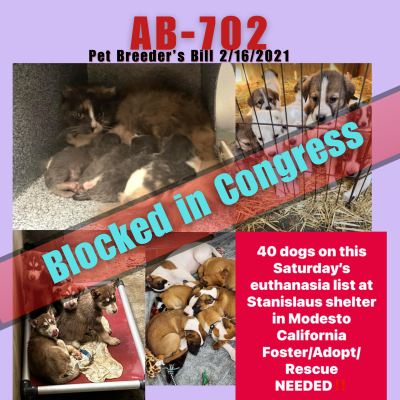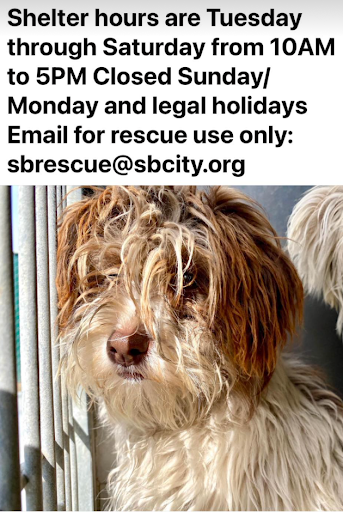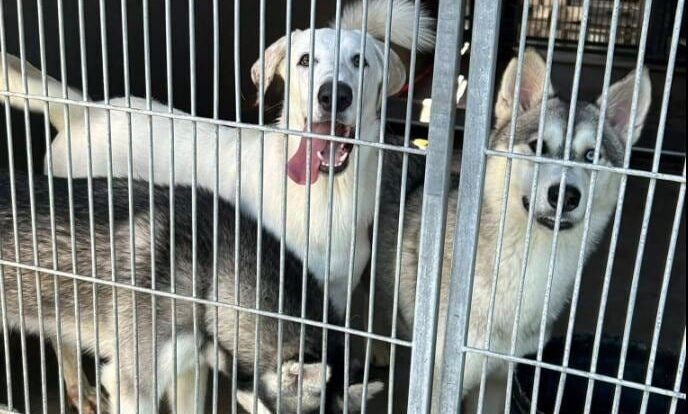California Needs Common Sense Animal Breeders & Sellers Laws AB2425
During Covid when shelters were emptying, backyard breeders realized they could capitalize on the fact that everyone wanted a dog or cat, so they bred and sold dogs and cats. Those animals went to other homes, many unaltered (not spayed or neutered) and either went on to have accidental litters or were bred as well.
Fast forward to 2023, all shelters across California are filled to the brim with unwanted puppies and young dogs that are euthanized every single day.
The supply is now outweighing the demand, in large because backyard breeders have no enforcement and no consequences. The only ones paying the price are those animals brought into this world, not standing a chance and their life ending in a cold, loud shelter by euthanasia. California is now #1 for the highest number of euthanized each year, as well as #1 in the homeless animals population in 2023 California also is at a 3-year high for euthanasia rates.
Current state:
Most animals entering municipal shelters are strays that were dumped/abandoned. The majority are not neutered and are not vaccinated. Due to the significant increase in backyard breeding, many “designer” dogs are ending up at shelters as well; such as doodles, yorkies, French bulldogs and other dogs that typically would not end up at a shelter such as Golden Labs, and Rottweilers. And of course the most common breeds to flood the shelters are American Pit Bull Terriers, German Shepherds and Huskies.
➡️ Nearly 90% of survey respondents said they’re receiving puppies from their communities.
➡️ More than 60% of respondents said they’re receiving doodles and other intentional mixed breeds.
➡️ Almost half (44%) said they’re getting more purebreds.
➡️ More than half (54%) said they’re getting “leftover” puppies/litters from breeders who can’t sell them.
➡️ Nearly 60% said they’re receiving surrenders (or surrender requests) of dogs that people say they paid a lot of money for and now can’t afford to keep.
One respondent commented, “We are having many doodles surrendered from backyard breeders that could not sell them and they’ve gotten too big to be desirable. Backyard breeders are breeding faster than we can save them.” Another said, “We have almost as many purebred or so-called designer hybrids as we do ‘regular’ mixed breeds come into our shelter each month. If you look, you can find almost anything in a shelter.” Quote from SAC Rescues Survey
Euthanasia rates across the state are increasing at rapidly high rates, compared to years past. For example, Palmdale and Lancaster animal shelters’ (who are run by L.A. County) euthanasia rates have increased from 18% in 2018 to 28% in 2023. 1,576 dogs were euthanized at these shelters from January through August of 2023 from the about 6,000 dogs that came into the shelter. Other contributing factors are the increase in intakes every year, 2023 being exceptionally high and adoptions being down 1.2% from 2022, specifically for large breed dogs.
A snapshot:
Dogs. Owner wants to surrender the dog. Rescues are full and can’t help. Dogs get abandoned/dumped → Animal control is called or the dog is brought in as a stray. The shelter may not take the dog if they are full and have no kennel space, OR if they do, the dog serves its stray hold (6 days). After this, the dog is assessed and either: put up for adoption, put on a euthanasia list with a kill date OR killed with no notice to rescues or the public. Dogs are either killed to make space for more dogs, who end up being killed as well; it is a never-ending cycle. Or they are killed for being timid/scared at the shelter, which many are.
Cats. Animal shelters in California are no longer accepting healthy cats and kittens. The community is told to leave the cats/kittens where they are found. This is causing a population explosion leaving un-altered cats in the community. The municipal shelters have put the responsibility on the community, cat trappers and nonprofit rescues to TNR (trap, neuter, release) these cats which is unsustainable when these groups spend their own funds or rely solely on donations. The government is nowhere to be found for help in controlling the population.
That should open your eyes to the crisis we are in: and there is no end in sight. You can see dogs being sold or given away for free on various social media platforms posing as being “rehomed”, or even in a parking lot out of the back of a truck. These breeders do not care where these animals go or if they are going to a good home and an owner that will properly care for them. They want their money and to get rid of these animals. These animals may be going to an owner that will neglect, abuse, or use the animal for bait.
The lack of regulation against backyard breeding is a direct correlation to the overcrowding, overpopulation and mass euthanasia happening in California municipal shelters.
A lack of governance from the federal and state levels
has allowed these groups to escape registration or notification, because the laws, if any, simply do not apply to them. Unfortunately, the lack of oversight has allowed these local problems to be so widespread that federal and state action is needed for any substantial correction towards small-volume breeding.
We need your support for bills like AB702 to be re-introduced to the Senate and Assembly and be voted on. AB702 was a Bill created by Assemblymember Miguel Santiago and was written to propose stricter laws, oversight and regulation of backyard breeders. It came with strong opposition from those that capitalize on breeding animals, the bill eventually died and never became a law in 2021. Article from AKC supporting the bill not passing
The AB702 bill had suggested: “Current law does not provide adequate regulation and accountability for these so-called “backyard breeders.” Lack of regulation and clear standards has led to unsafe overbreeding of cats and dogs. California must ensure that dogs and cats being bred are cared for properly. We must also prevent the unnecessary euthanizing of thousands of cats and dogs in California. AB 702 would bring greater transparency to the industry while benefiting responsible breeders and improving outcomes for animals and families. Specifically, this bill would require “backyard breeders” to obtain a breeder permit with higher health and safety requirements for the care of bred cats and dogs, as well as place limits on the number of litters per animal per year’. Quote From Social Compassion in Legislation
The absence of clear laws empowers irresponsible and greedy individuals, endangering community health. Sick animals due to poor breeding practices are spreading in shelters, leading to expensive overpopulation and costing taxpayers billions. Yet the high euthanasia rates are entirely preventable. It’s tragic to see that all of this could have been avoided. Congress’s failure to acknowledge the looming catastrophe, by blocking the Breeders bill in 2021 and the lack of scaling back on breeders, has only exacerbated the situation. The dire situation for Californian animals shows no signs of slowing down.
However, we can change this trajectory if communities unite and speak up for change. Together, we can make a difference in breaking this cycle of tragedy. The crisis is indiscriminately sweeping away young, healthy animals, as if they never existed. Establishing the right legislative structure will yield positive results and put an end to enabling bad breeding practices. It’s time to take action and create a better future for animals in California.
The solutions are simple:
Clear regulations of Breeders operations – hand in hand with social media platforms restrictions:
- Require backyard breeders to register Backyard breeders do not pay Taxes when sell animals, proper sales registration will generate significant revenue, that can be used to support Animal welfare in the State
- Put parameters around animals breeding, including Capping litters per 1 animal per 12 month period
- Additionally, no offspring should be sold or otherwise transferred until it has reached eight weeks of age, immunized against common diseases, and has been issued a Veterinary certificate of health.
- Require Microchip all newly bred litters that identify the breeder, which shall remain on the microchip along with the identity of the new owner upon the sale or transfer of the animal.)
- Temporary Moratorium on Breeders licenses for Dogs
- Establish Government Public Directory Where PUBLIC can report Backyard Breeders in their Neighborhoods: With increased visibility, regulators could target these wrongdoers more efficiently.
- Congress to allocate funding, for comprehensive enforcement
Please take a moment to write to elected officials and request their leadership in moving Breeders Laws Issues forward and on top of the Legislative agenda. Together, let’s ensure that this important legislation receives the support and resources it needs to make a positive impact on our communities.
Currently there is an important proposed legislation piece that needs our support: AB 2425 Animals: adoption, shelter overcrowding, and breeding regulations.
Assembly Member Bill Essayli (R-Corona) introduced AB 2425, a bill sponsored by Social Compassion in Legislation (SCIL), that will expand the definition of breeder by lowering the number of dogs that must be bred for breeding regulations to apply, and ensure that all dogs sold by breeders are microchipped and vaccinated. The bill also includes provisions requiring that shelters post the adoption availability of animals on their website or a third-party website. Lastly, it will order the California Department of Food and Agriculture to conduct a study on overcrowding in California shelters and potential remedies, including a statewide database listing all dogs and cats available for adoption. AB2425 Summary
Additionally, a draft letter has been created that you can easily send to Legislators.
Please share this with your family, friends, coworkers, and social media platforms. This problem has only gotten worse in the past four years. If our state’s elected officials do not step in, we do not stand a chance at reversing this problem. That means more animals continue to suffer and shelters will continue to respond to the problem with euthanasia.
Please contact your Legislators and urge them to Support AB 2425 and introduce more new bills to systematically address the California animal overpopulation Crisis. This is a crucial time and animals need your support.

AB 2425 Animals: adoption, shelter overcrowding, and breeding
Irresponsible dog breeders can cause hundreds of thousands of healthy dogs to be put to death each year. That irresponsible behavior known as backyard breeding is an amateur form of dog breeding that typically occurs at home, often without regard for a dog’s health. Because backyard breeding typically occurs within private homes, it often goes undetected. It’s also a main contributing factor to pet overpopulation, facilitates dog fighting and gang activity, and burdens consumers with sick puppies.
Stopping Backyard breeders - Exposing the Hidden Problem Of Young Animals at Shelters.

While for many of us cats and dogs are valued members of our families that are loved and cared for, others see them purely as a source of income through breeding or trading, or an unnecessary burden if they become strays. The illegal pet trade affects not only the health and welfare of the cats and dogs involved, but also consumer rights, public health – by potential exposure to zoonotic diseases – and tax revenues collected at the State level. It also feeds directly into stray populations if animals get abandoned.
Individual dog breeders are just as unethical as any puppy mill but on a smaller scale. Not only is using an animal’s reproductive ability to make a quick buck lazy and wrong—doing so also adds to the overpopulation and homelessness crisis, just as puppy mills do.
And just like puppy mills, breeders often breed dogs with health problems, passing along congenital issues that cause suffering in litter after litter. From PETA
Why are backyard breeders bad?
News on this topic:
Multiple Bills quietly die in California without transparency…
This year, approximately 8.5% of animals entering shelters have been euthanized, marking a nearly 2% increase from 2021…
The suspense file hearing in the California Legislature, happening twice a year, determines the fate of numerous bills without public debate, leaving many bill authors and interested parties frustrated…

